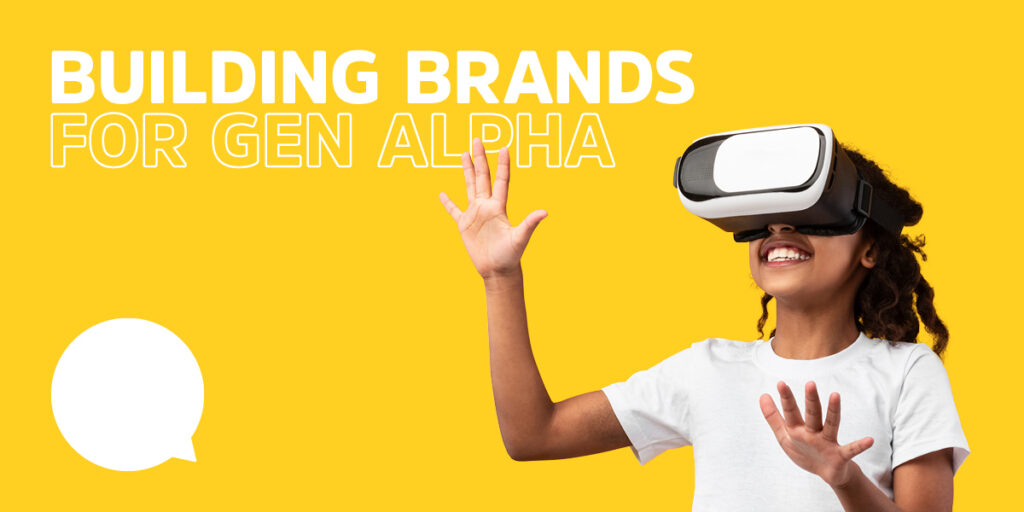Future Thinking: Building Brands for Gen Alpha
30th November 2022
You may have already heard of Gen Alpha, but if not, read our generation game blog first to get up to speed with the ‘generations’ marketers use to define certain segments of the population.
Generation Alpha refers to anyone aged between 0 and ten years old. Marketing to kids has been a key objective for many decades (remember how cool the adverts were on Saturday mornings between the cartoons?), but in line with our desperation to categorise every single person on earth into a group that can be marketed to, we’ve decided that the literal ‘next generation’ is going to be more important than any other group of kids to have existed. And here’s why Gen Alpha needs to be catered for right now.

Gen Alpha are the first true digital natives
If you’re under 30 and reading this, then you’ll probably class yourself as a digital native. Smartphones or at least mobile phones have been in your life since you could remember, you probably have or had a computer or games console at home, and life without high-speed internet is probably a fuzzy or non-existent memory.
But for Gen Alpha, all of the tech we’re used to will be at their fingertips from the moment they’re born. Babies are plastered automatically all over social media, the products we put in nurseries at home are often packed with IOT tech, and we’re handing over iPads and iPhones loaded with Peppa Pig to keep our toddlers entertained while we do the stuff they’d usually squirm at.
As soon as they start learning their ABCs and 123s, Gen Alpha will already be mastering keyboards, trackpads and touchscreens.
The older kids in the Gen Alpha are probably already digital-first advocates. Whether that means doing homework on a laptop rather than in a jotter, or begging Mum or Dad for extra Roblox currency, they will have literally no concept of a timeline that doesn’t include instant access to Google and everything that comes with that.
And this leads to a generation that will naturally begin to consume at a much earlier age. Exposure to digital adverts, access to information mega-vaults like Wikipedia and YouTube will fill Generation Alpha with the kind of aspirations and behaviours that even millennials couldn’t comprehend at age ten.
Marketers suddenly have a whole world of ultra-informed, digital experts who will reach adolescence over the next ten years. And their behaviours and habits will look, unlike anything we’ve seen.
Whether that’s using AR and VR without seeing it as a fancy new gimmick, or being fully aware of the ethics and CSR behind the companies they want to buy from before they make it to middle school, the marketing we’re used to may not cut it for Gen Alpha.
Planet First
One thing that Gen Alpha will have built-in from birth is a very strong awareness of sustainability and our impact on the environment. This means brands also need to have this awareness built in, and prominent – Gen Alpha expects that as a bare minimum.
It’s about more than a few empty promises, or even worse greenwashing, and more about sustainability and carbon neutrality being core business tenets. Gen Alpha will learn of the ‘evils’ of fossil fuels from a very young age and brands associated with heavy industry will need to work hard to build trust, discarding the usual tactics and instead focusing on hard evidence when it comes to their ethics and operations.
Gen Alpha are the questioners
If there was another name for Gen Alpha, it would certainly be ‘the questioners’. Why? Because every minutia of detail will be interrogated to a deep level. After their parents fell for the ‘fake news’ of the late 20 teens, and the ability of Google to show the ‘truth’ in seconds, Gen Alpha’s information journey will look something like this, compared to previous generations:
Previous generations
View information > apply existing knowledge > judge source > align to personal ideals > accept or reject information as correct
Gen Alpha
View information > apply existing knowledge > research source > check social proof > judge source > compare against personal ideals > accept or reject information as correct > analyse choice.
As you can see, the cognitive process behind processing information becomes more complex as Gen Alpha are taught to question sources, question statements, and even question their own reaction and judgement. This makes them instantly better at spotting fake news and making decisions based on cold hard facts, rather than brand or personal trust.
For brands, this means steering away from the tried-and-tested statements and marketing tactics, and investing heavily in social proof, consumer awareness and trust, and bulletproof product journeys. If your product or service can be picked apart after a quick Google or fact check, then Gen Alpha will look elsewhere.
With these three quick takeaways, you can start to think about the long-term goals for your brand. And at the heart of this needs to be audience data. Collecting thoughts, sentiments and habits will take you far with Gen Alpha, as it will be easier than ever before to tap into the online habits of a generation that will place internet access somewhere in the middle of Mazlow’s hierarchy of needs.

